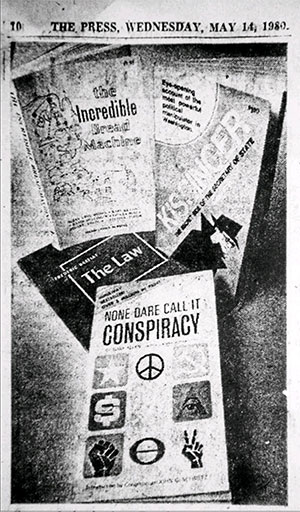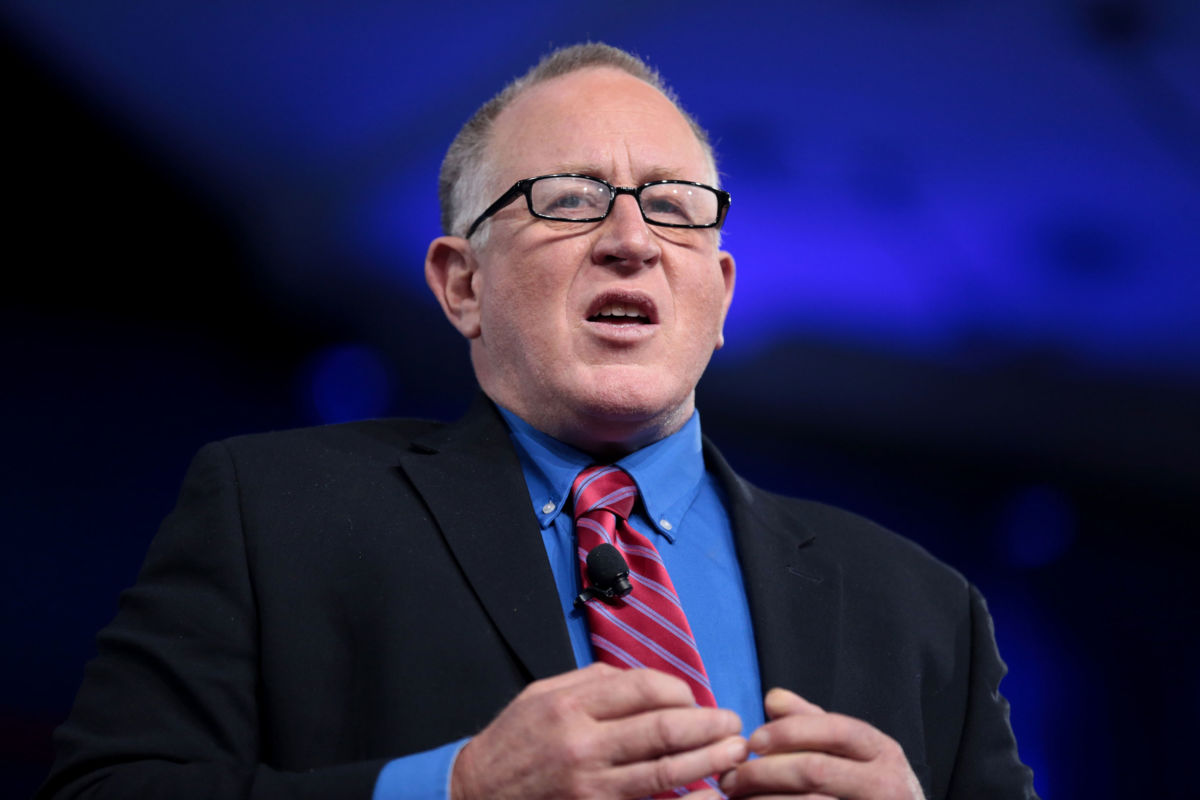Support justice-driven, accurate and transparent news — make a quick donation to Truthout today!
Trevor Loudon might not be a name familiar to many in U.S. political circles. He certainly is no Steve Bannon or Roger Ailes, but the impact of his actions are felt just as hard as the actions of any other shadowy financier or strategist lurking behind the curtain of right-wing politics. Yet unlike the Koch brothers or Robert Mercer, if you’ve ever simply attended a political rally or merely mentioned your support for progressive policies online, you might already be on his radar and your personal information could already be published on his website.
The Making of Trevor Loudon
A decade ago, Loudon first made major headlines by publishing arguments for why he thought President-elect Barack Obama was secretly a communist. Though the evidence given against Obama was described by The Washington Post as “ranging from the absurd to the merely questionable,” that didn’t stop Loudon’s conspiracy theory from traveling like clockwork through the circuit of online message boards and Facebook groups until being picked up as a common slur against the president by the far-right radio show circuit. Being repeated by the likes of Michael Savage and Rush Limbaugh, it eventually gained enough traction to begin getting presented as fact on places like Fox News to millions of Americans.
At the time, you wouldn’t need to look further than the signs at a Tea Party rally to see the impact that Loudon’s accusation against the president had. Though this was the beginning of Loudon’s influence in the United States, the history of his work goes back much further.
It was in 1986 when Loudon first became involved in politics, establishing the Campaign for a Soviet-Free New Zealand. The group aimed to expose a conspiracy involving the Soviet Union secretly subverting the “New Zealand way of life” through a slew of shadowy puppet figures the Soviets controlled and ordered to do their bidding with the goal of turning the country into a communist dictatorship.
This fight to expose the Marxist “master plan” involved gathering information on anti-nuclear activists, Labour Party members, pastors from the National Council of Churches, anti-apartheid campaigners and Indigenous Māori community leaders — all of whom Loudon claimed were communist subversives which he exposed to his community of 800 followers through his newsletter, “New Zeal.” Other actions by the group included staging protests, handing out pamphlets and fighting to ban the import of Russian cars, which Loudon claimed were built through slave labor.
Before creating his group, Loudon’s life had a much more unusual purpose though.
Loudon’s Radicalization Through the Zenith Applied Philosophy
According to entries from his blog, he had previously spent at least six years studying as a student of the “Zenith Applied Philosophy.” This philosophy was created by combining the teachings of Scientology, aspects of Eastern mysticism and the philosophy of the right-wing John Birch Society.
The core idea behind the philosophy is that some people are born on “higher dimensional wavelengths,” and if those people pay the Zenith Applied Philosophy’s founder John Dalhoff between $860 to $1,900, he will give them a personality test. If someone passes this test, they could attend classes in which Dalhoff would preach about his supernatural powers (such as his ability to stop earthquakes) and warn about dangers of “communist space aliens” who secretly rule the world through their human disguise as Jewish bankers and who are out to get Dalhoff and his followers.
The group became a staple of the Christchurch, New Zealand, area throughout the ‘70s and ‘80s. Adherents would preach on the street while soliciting passersby with pamphlets and books that argued taxation was a form of government theft and that the U.S. civil rights movement had been controlled by the Soviet Union to usher in a New World Order.

Dalhoff charged upwards of $3,000 per class to teach the Zenith Applied Philosophy and reportedly drained the financial assets of many of his students while becoming a millionaire in the process. Unsurprisingly, this led to the philosophy and the organization behind it to be labeled publicly as a cult.
By 1990, the group’s membership had declined from hundreds of active members to only 20-30 of the most loyal followers — including Trevor Loudon. Despite its reputation, Loudon has in recent years passionately defended the philosophy, claiming he continues to study it and plans to keep doing so indefinitely.
Loudon’s Influence Crosses Continents
The rise of the internet found Loudon’s ideas being discovered and quickly embraced by U.S. conservatives in a way that wasn’t done by their New Zealand counterparts. From this exposure, Loudon ended up fast friends with Fox News host Glenn Beck, who used his platform to interview Loudon on numerous occasions. Around this time, Beck also often began repeating views or ideas that Loudon originally proposed, such as Obama secretly being a Marxist, and that top Obama advisers had connections with foreign powers like the Cuban government and the KGB.
As the U.S. began moving into the Obama era, Loudon became more strategic with his campaign to fight against communists, whom he believed were manufacturing the majority of the world’s drugs and infiltrating the world’s governments. That’s when he began work on a website known as KeyWiki.
With more than 120,000 articles, KeyWiki may currently be one of the largest repositories of political information on the entire internet. From posting the locations of elderly individuals who attended civil rights marches 60 years ago, to digging up every left-wing Facebook page liked by staffers for the Congressional Black Caucus, Loudon manages to maintain a mind-numbingly massive database of individuals involved in all manner of U.S. left-wing politics. It appears even simply liking posts on anti-Trump Facebook pages is enough to get your name leaked on the site and have information about you chronicled by its editors.
“We’ve got congressmen in there, peace activists, labor unionists, black radicals, religious socialists, greenies, left-wing academics, Obama appointees and thousands of card-carrying socialists and communists,” Loudon said in announcing the creation of the website. “In short, all the people who are dragging America down.”
Much of the process of gathering information on the site appears to be automated by bots and web-scraping software. One Reddit user described the actions of the wiki as follows:
A protest is organized on Facebook. It’s tagged #BLM or #FightFor15. People pledge to be there using their real names. Afterward, photos are posted and faces tagged, again with full, real names. News articles are shared and tagged the same. Key wiki searches for the popular left hashtags scrapes the data it finds, and creates profiles for every name mentioned in the articles and every face tagged in the photos, and builds a network of connections between activist circles based on who liked which posts and who is friends with whom.
Yet actually attending protests isn’t required for someone to be labeled among the website’s list of radicals and communist subversives, as many have discovered.
The Left Is Targeted on KeyWiki
James Hare found he had an entry on KeyWiki after he listed on LinkedIn that he had been hired by the New York branch of the German policy research group, The Rosa Luxemburg Foundation. He also discovered his page contained pictures of him which were screen-capped from YouTube videos he had appeared in.
Journalist Claire Downs found that she had a page on the site simply because she briefly joined a private feminist Facebook group which she wasn’t active on.
Downs also discovered that information against activists found on the site had already been weaponized by certain right-wing groups and was being disseminated on places like Reddit’s infamous forum dedicated to Donald Trump supporters called “r/The_Donald,” along with other various “men’s rights” groups.
Activist Olivia Katbi Smith is co-chair of the Democratic Socialists of America’s Portland, Oregon, chapter and has been profiled by KeyWiki. “One thing that creeps me out about it is that it lists who I’m married to and links to his page,” Smith told Truthout. “It has potential to be really damaging and threatening.”
Groups like Democratic Socialists of America (DSA) often organize public community events that KeyWiki uses to target activists. Smith says she’s certain that attendance to these events are lower than they would be if KeyWiki hadn’t been created, as folks may be concerned that attending could lead to their personal phone numbers being leaked with pictures of them on a site that claims they are a communist — a practice known as “doxxing,” which KeyWiki has done before and which could lead to harassment.
Smith says that KeyWiki and other sites like it — such as Canary Mission, a database used to blacklist pro-Palestinian activists — have routinely created pages containing false information that has led to people losing their jobs and sense of personal safety. “The fear of being doxxed is real for all of us in DSA,” Smith said. “We try our best to have a culture of security and safety, but as a public-facing organization, it’s unfortunately one of the risks of being involved.”
One of the main problems with KeyWiki seems to be its lack of transparency. Unlike the normal Wikipedia, where anyone can edit and add content, the only way to correct misinformation on the site is by writing an appeal on the discussion pages of articles and hoping one of the currently 20 approved site members decides to change the page accordingly, which wouldn’t be much of an issue if misinformation wasn’t so commonplace on the site.
It’s not known how many people have actually been affected personally by the site, but it doesn’t take much imagination to understand the ramifications if an employer or family member searched someone’s name only to discover the first result on Google is a lengthy biography that includes private photos and personal information while labeling the person a “radical extremist.”
Meanwhile, in recent years, Loudon’s fame has only continued to grow. After publishing a number of books and documentaries which claim (among other things) that North Korea and Iran were responsible for anti-Trump protests, Loudon was invited in 2017 to speak at the Conservative Political Action Conference on a panel moderated by the wife of Supreme Court Justice Clarence Thomas. He was also featured alongside legendary conservative figures such as former Reagan Attorney General Edwin Meese and conservative leader Phyllis Schlafly in a conservative video soon after that.
Despite the support from the right-wing establishment, it seems that KeyWiki is not enough to deter or prevent the rise of left-wing activism like Loudon was hoping for.
With political activism in the internet age only gaining momentum, perhaps websites like this are to be expected. As internet monitoring continues to become more commonplace, the lines between online accounts and real people’s lives will continue to blur.
Still, given the chilling loss of privacy and safety reported by those featured on the site, it’s clear that KeyWiki still remains a solitary example of the importance of online anonymity for activists, no matter how innocuous a person’s activism may be.
Trump is silencing political dissent. We appeal for your support.
Progressive nonprofits are the latest target caught in Trump’s crosshairs. With the aim of eliminating political opposition, Trump and his sycophants are working to curb government funding, constrain private foundations, and even cut tax-exempt status from organizations he dislikes.
We’re concerned, because Truthout is not immune to such bad-faith attacks.
We can only resist Trump’s attacks by cultivating a strong base of support. The right-wing mediasphere is funded comfortably by billionaire owners and venture capitalist philanthropists. At Truthout, we have you.
Truthout has launched a fundraiser, and we have only 24 hours left to raise $17,000. Please take a meaningful action in the fight against authoritarianism: make a one-time or monthly donation to Truthout. If you have the means, please dig deep.
